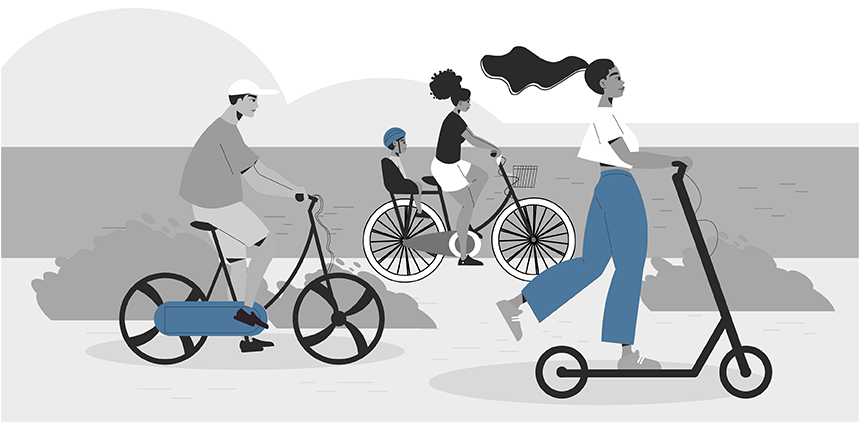E-bikes & e-scooters

The Future of Cambridgeshire Travel
E-scooters provide an easy and low cost way to travel around Cambridge and have been in operation since October 2020 as part of a wider government trial.
To support a ‘green’ restart of local travel and help mitigate reduced public transport capacity, in July 2020, the Department for Transport (DfT) made regulations allowing trials of rental e-scooters to be fast tracked and expanded.
At the time, e-scooters offered a way of travelling and remain socially distanced during the pandemic. Now, they are particularly useful for connecting the last or first mile of travel, when there can be a temptation to use a car or taxi and for journeys of 1 to 3 miles, which make up 60% of all road trips in the U.K. Our aim is that e-scooter use should be affordable, particularly for those who need to go farther than they can walk and don’t have access to a car.
What are we doing for e-vehicles?
European e-scooter operator Voi have been operating e-bikes and e-scooters in the centre of Cambridge since the start of the trial.
Electrically assisted bikes provide a safe and healthy alternative mode of travel to the private car, bus or train which helps to reduce carbon emissions and improve riders’ fitness at the same time.
E-scooters allow visitors, tourists, students, and commuters to make quick short journeys across town. It is thought that 60% of current car journeys are only 1-2 miles in length and e-scooters and other modes of active travel could help significantly reduce unnecessary reliance on cars for these short journeys.
The partnership between Voi and the Combined Authority aims to reduce CO2 emissions and replace private car trips. On average, 106 deaths per year in the Greater Cambridge region alone can be attributed to air pollution, with emissions from cars and emissions from cars and emissions per capita 50% above the national average in Cambridgeshire.
Scooters can get you from place to place rapidly – there are geo-fenced slow speed zones for safety’s sake and outside of these zones, top speed is 12.5 mph. The scooters will not function if they are driven past the zone’s invisible boundary.
The trial is currently due to end on 31 May 2024.
The Scheme will…
- Gets people out of cars
- Provides convenient, affordable and flexible travel for point-to-point journeys, or for the first or last mile to public transport
- Lowers environment footprint, improving air quality and reduce climate change
How can e-scooters help to solve the transport problems in towns and cities?
E-scooters and E bikes are just the start of a revolution in how we move around cities.
They allow for personal point-to-point travel, which means that a rider is not tied to a timetable or a route.
They are particularly useful for connecting the last or first mile of travel, when there can be a temptation to use a car or taxi and for journeys of 1 to 3 miles, which make up 60% of all road trips in the U.K. Our aim is that e-scooter and e-bike use should be affordable, particularly for those who need to go farther than they can walk and don’t have access to a car.
Plan your Journey